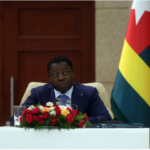By Emily Sims
New York, NY – A US judge on Wednesday dismissed corruption charges against New York City Mayor Eric Adams but sharply criticized the Trump administration’s decision to request the dismissal, calling it a move that “smacks of a bargain.” The Justice Department had argued that the case was distracting Adams from assisting the Trump administration’s efforts to ramp up immigration deportations.
US District Judge Dale Ho, in a 78-page ruling, stated that while the court lacked the authority to compel prosecutors to pursue charges, the Justice Department’s rationale for seeking dismissal was deeply troubling. The request, filed in February, citing the need for Mayor Adams’ cooperation in the administration’s immigration crackdown, had sparked widespread controversy. Eight federal prosecutors resigned in protest, alleging that the administration was improperly allowing political considerations to influence prosecutorial decisions, violating established norms.
“Everything here smacks of a bargain: dismissal of the indictment in exchange for immigration policy concessions,” Judge Ho wrote, emphasizing that an individual’s criminal liability should not be contingent on their support for the administration’s policies.
Adams, 64, had pleaded not guilty to charges of accepting bribes and illegal campaign contributions from Turkish officials in exchange for favors, including lobbying fire officials to approve the opening of a new Turkish consulate in Manhattan despite safety concerns. The charges were initially brought during the final days of the Biden administration.
Speaking to reporters outside his residence, Mayor Adams welcomed the dismissal, stating he had done nothing wrong and that the case should never have been brought. “I am now happy that our city can finally close the book on this and focus solely on the future,” he said.
Responding to the dismissal, a Justice Department spokesperson claimed the Trump administration was focused on “prosecuting terrorists” and the department’s “core mission of keeping Americans safe.” The spokesperson added, “This case was an example of political weaponization and a waste of resources.”
The Justice Department had argued that public officials trading one public act (dropping the prosecution) for another (immigration cooperation) did not constitute a “quid pro quo” akin to a personal gift or bribe. Judge Ho vehemently disagreed, highlighting the potential for political favoritism in prosecutorial decisions.
“The breathtaking implications of DOJ’s position … are difficult to square with the words engraved above the front entrance of the United States Supreme Court: Equal Justice Under Law,” Judge Ho wrote. He stressed that his decision was not a determination of Adams’ innocence or guilt.
The ruling leaves a shadow of doubt over the integrity of the Justice Department’s decision, raising questions about the politicization of justice and the potential for future administrations to leverage prosecutorial power for political gain.









